Aaron Sorkin is an Oscar-winning screenwriter best known for his work on The West Wing. In his first ever MasterClass, he teaches screenwriting for both TV and feature films.
Knowing he is one of America’s most prolific screenwriters, I was keen to know what Aaron Sorkin's MasterClass is like and what it could teach me about the world of screenplay.
In this Aaron Sorkin MasterClass review, I’ll be answering these questions and sharing my honest opinions about the class with an emphasis on what I learned and how it could be improved.
With over nearly 8 hours of content, Aaron covers a lot of material, so this review will be fairly lengthy! But if you just want the headlines, here are the key points:
.
Quick summary
Learn how to:
- Develop interesting characters
- Craft captivating dialogue
- Find and incorporate research
- Understand your audience
- Create compelling story arcs
- Exercise strong writing habits
- Write and link scenes
- Approach rewrites and edits
Pros
- Learn from a proclaimed screenwriter
- Understand the rules of drama
- View strong case studies
Cons
- Overlong workshops
Course Length: 35 videos, 7hr 58m
Best for: Aaron Sorkin devotees who want to develop a deeper understanding of his works and those who are just starting out in the world of screenwriting.
Overall: For anyone with a screenplay in the back of their mind, the Aaron Sorkin MasterClass is a great opportunity to help you start writing. I found him motivating throughout and liked that he included case studies and workshops.
In this detailed Aaron Sorkin MasterClass review I’ll be covering the following:
- What Aaron Sorkin’s MasterClass includes
- What I liked and felt could be improved upon
- Who the course best suits
- Price, alternatives, and whether the content is unique
First some basics:
About Aaron Sorkin
Aaron Sorkin is an American screenwriter and director, most widely recognized for his work on The West Wing and A Few Good Men.
He won the Academy Award for Best Adapted Screenplay in 2010 for his work on The Social Network (one of my favorite films).
His 2015 biopic, Steve Jobs, won him a Golden Globe Award for Best Screenplay.
He has also received 5 Primetime Emmy Awards for The West Wing.
If you haven't seen the trailer for this MasterClass yet, I highly recommend you watch it:
Sorkin's class also ranked #1 in our best screenwriting course review.
About MasterClass
MasterClass was founded in 2015 as an online educational resource. It specializes in video-based courses covering a range of topics from Physics to Cooking.
Its unique selling point is its teaching. MasterClass has over 190+ classes presented by those who have achieved celebrity status in their field of expertise. For example, Gordon Ramsay, Hans Zimmer, and James Patterson.
So while other websites feature academics, MasterClass takes learning a step further by allowing you to learn from revered household names.
Although MasterClass is unrivalled in its branding and high production values, it might not be for everyone. I hope to draw attention to its pros and cons to help you decide whether this course is for you.
If you want more details on MasterClass and some of its most popular classes, check out our Masterclass review and best MasterClass article.
Inside Aaron Sorkin’s MasterClass
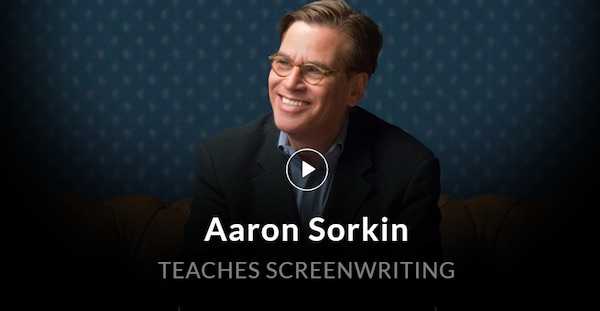
Aaron Sorkin’s MasterClass spans 35 videos of between 5 and 20 minutes. This amounts to a viewing time of nearly 8 hours.
As well as this, MasterClass offers the following resources:
- A 33-page class Workbook.
- The screenplays for A Few Good Men and The Social Network.
- A “Continuity and Spotting List” for Steve Jobs
After a short introduction the class continues with:
Lesson 2: Intention & Obstacle

“You have to build the drive shaft first.”
Aaron opens by laying out two key points we must establish before we write: intention and obstacle. He dives straight into what he means by this and suggests ways we can determine whether our intentions and obstacles are strong enough.
This lesson got the ball rolling very quickly in what I thought might have been a slower-paced course. Aaron prompts us with questions to ask ourselves when writing and delves deep into what makes a great story.
One highlight of this section was his contextualizing of the differences between various forms of screenplays – TV vs film – and what we should do differently when approaching each one.
I found this a useful way to set up the course, as it showed Aaron’s intention to explore more than one format. In fact, he elaborates further on what audiences expect from different forms and how to use pacing to best grip the viewer’s attention.
Lesson 3: Story Ideas
“Once you’ve found the conflict – once you’ve found the intention and obstacle, it’s like a taut clothesline that you can hang everything else on.”
Aaron proposes that there are two parts to having an idea. With this in mind, he teaches us how to recognize if we’ve caught onto something worthwhile and, if so, how to use it.
He covers these particular topics:
- Finding conflict in your story
- The metaphor of “baseball pitches”
- Feature film vs. TV ideas
- How to start writing
- Exercises to help develop screenwriting ability
- Questions to ask when approaching a screenplay
- Remaining open when writing
What I enjoyed about this lesson was how practical it was. While Aaron does show us a case study for The American President, most of his advice was matter-of-fact and he gave us some writing tasks we could try for ourselves.
One great takeaway from this lesson was Aaron’s insistence that we can write before having a fully formed idea; he tells us how this worked for him when writing Steve Jobs.
Lessons 4-5: Developing Characters
“Characters are born from an intention and an obstacle.”
Aaron does a great job of tying in previous lessons to reinforce understanding. Here, he shows how he brings intention and obstacle to bear on character using The Social Network and The West Wing as case studies.
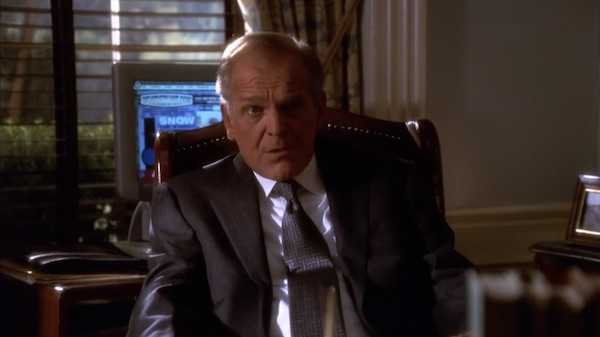
Aaron shows us how he introduces tactics to give characters their uniqueness. He also considers the relationship between character and actor, and how one can be enhanced by the other.
Lessons 6-7: Research
“You never know where a cool story is going to come from.”
Here, Aaron discusses the two types of research that exist and the hurdles that come with each. His emphasis on talking to others to find a network of stories was particularly interesting. It was a concept I’d also heard of from Malcolm Gladwell’s MasterClass.
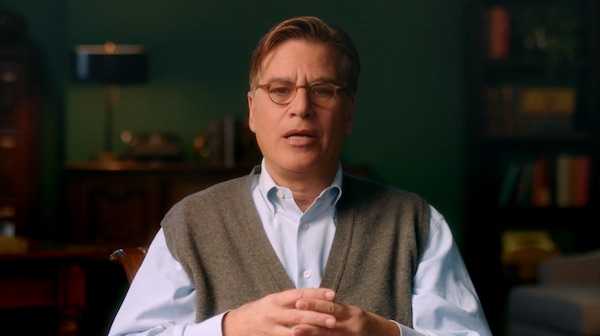
Aaron discusses his research for Steve Jobs and how he approached meetings with Steve’s daughter. This was a nice way of getting a glimpse into the procedures used when writing non-fiction and gave an interesting comparison to fictional character-writing.
He also poses a question at this point: “How do you incorporate research?” He spends the rest of the chapter addressing this topic in relation to:
- How he created The West Wing
- Using research to write dialogue
- How research comes together in the Writers’ Workroom
- Forming narratives for non-fiction works
- Toggling between truth and creative license
This section considers the moral conundrum of altering non-fiction for dramatic purposes. Aaron offers some interesting context for this dilemma and suggests ways in which we can strike a balance between fairness and dramatization. It was particularly useful to see how he did this with Steve Jobs.
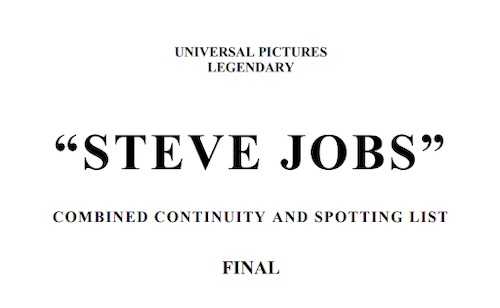
What I enjoyed about this section was Aaron’s feeling of indebtedness towards the families of those he represents in his non-fiction work. He poses theories for how we can navigate the moral landscape of adapting a biopic and how to decide what we should stay true to.
Lesson 8: Audience

“The audience is a component in the event.”
Aaron begins this section in reference to George Seurat’s painting, A Sunday Afternoon on the Island of La Grande Jatte. He compares Seurat’s techniques to his own and relates this to how he communicates with his audience.
In this section, we also learn how to do the following:
- Treat our audience
- Maintain clarity
- Assess a screening
- Decide what to show and what to tell
According to Aaron, the audience wants to participate, and he outlines how we can help them do this. He also considers the time-frame in which a viewer decides to invest in a show/film, or switch off.
He even shares ways in which his film adaptations have failed to impact the audience in the ways he intended. Using A Few Good Men as a case study, he highlights scenes that didn’t translate from a Broadway play to a feature film audience. This was a good way to consider audience expectations of different media.
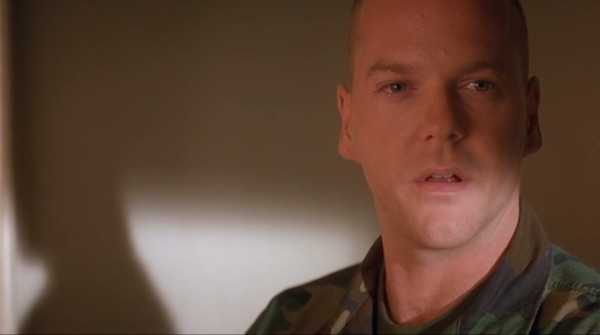
Lesson 9: Rules of Story
“Rules are what makes art beautiful.”
For Aaron, there are certain methods of study we can use to ascertain common threads across the best screenplays out there.
He shares a text which he claims is the universal rulebook for drama that no good work deviates from. Knowing these rules, Aaron claims, enables us to diagnose our work to figure out what isn’t working. He sets an exercise to help with this.
At the end of the lesson, Aaron concludes that a flaw in our writing is likely down to a deviation from the rules of drama. This seemed like a startlingly simple solution to something many writers ponder over.
I liked that Aaron broke this down for us, and though I doubt it will be a fix-all method for rewriting our scripts, it was certainly a point of view worth bearing in mind.
Lesson 10: Film Story Arc
“You want the stakes to be as high as possible.”
After establishing the rules of drama, Aaron elaborates on how they relate to structure and narrative. For me, this was the class’s strongest chapter. Aaron goes into great detail about the practicalities of writing drama, down to the page numbers we should use as anchor points for our story.
While Aaron’s advice isn’t definitive, it is helpful. In particular, it breaks down a complex process into an easy-to-digest formula. He covers the following:
- Story vs. drama
- Rules of the 3-act structure
- How to raise the stakes
- Exposition
- Inciting action
- Creating a hook
This chapter was useful for setting out not only the rules of drama, but how we can use page numbers as “road signs” to ensure certain boxes are ticked.
According to Aaron, we only have a short time to grip the viewer and keep them watching. This section teaches us exactly how we can do that and uses Steve Jobs as an example.
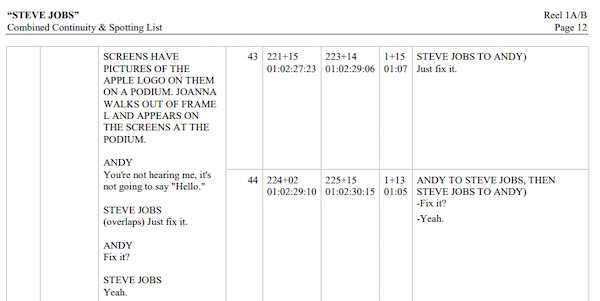
What I liked about this section was how specific Aaron was when it came to setting out certain rules and conventions. He proposed this as a sure-fire way to get viewers invested, and ultimately, to write drama well.
Lesson 11: Writing Habits
“I think you have to write what you like.”
Here, Aaron shares with us some realities about his writing process. Mainly, he outlines what we need to establish before we start writing and gives some tips on where we should start. He details:
- The software he uses
- How he organises notes
- How he overcomes writer’s block
- The importance of mood when writing
Aaron ends by sharing ways in which we can focus on progress. This includes the use of index cards, check lists, and (unconventionally) writing on napkins. He says these are vital tools for helping us emotionally, as they can confirm a sense of accomplishment when we work through them.
Lessons 12-16 Group Workshops
“I don’t care about reality. All I care about is the appearance of reality.”
Aaron’s group workshops cover about half of the course. These include table-reads with a group of four students in what resembles a “Writers’ Room” setup.
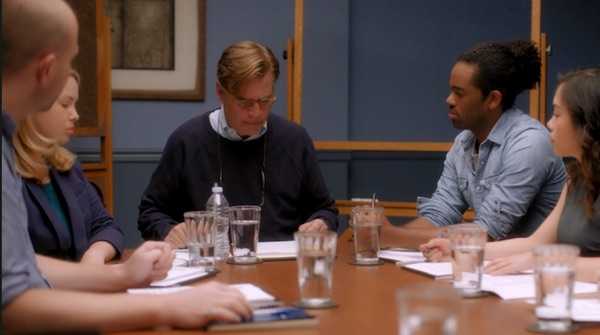
The group reads through each other’s scripts, including loglines and pitches. There’s also a bonus chapter where Aaron pitches his own screenplay idea. After the group read-through, Sorkin gives feedback to each student, focusing on what’s good and what needs improving.
Aaron reinforces the rules of drama and asks some logical questions of the students to guide their writing. He gave some useful advice on students’ individual scripts, and also some words of wisdom that we could all take away.
Lessons 17-18: Writing Scenes
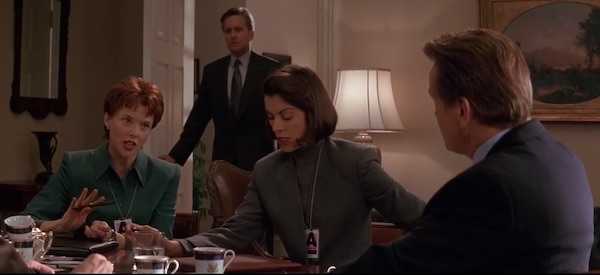
“You have to be moving the story forward.”
Here, Aaron discusses how to write scenes purposefully in order to serve the story. He emphasizes the importance of movement between scenes and how to launch from one scene to the next.
It was nice to consider Aaron’s approach to scene transitions and how it differed from what I’d seen in other writing courses. He gives us some good examples from The West Wing to illustrate how he uses these techniques.
Along with scene transitions, he also teaches us how to:
- Write to reward patience
- Construct powerful scene endings
- Gain traction in early writing
- Introduce characters
- Use comedy
- Grab the audience
This chapter gave a lot of useful case studies, including both The American President, The Newsroom and The Social Network. I found it helpful to hear Aaron’s theories and see it presented in a visual scene. This was a nice way to clarify the lesson and show us how good writing appears in practice.
Lesson 19-22: Scene Case Studies
“You want to show the audience what a character wants.”
Here, Aaron provides more detailed scene studies from his works. He introduces each with some context along with what he wanted to achieve in the scene. This was an interesting way to pull together points from all the lessons so far and offered a break from just listening.
Aaron focuses on the following topics:
- Using scenes to clarify intention
- What description needs to achieve
- “Three things in a pile”
- Building the drive shaft
- Humanizing characters
- Drawing from our own perspectives
This section does a good job of bringing together theory and practice. For example, Aaron cements his previous lessons on intention and obstacle by showing us a relevant clip of Steve Jobs and Andy Hertzfeld.
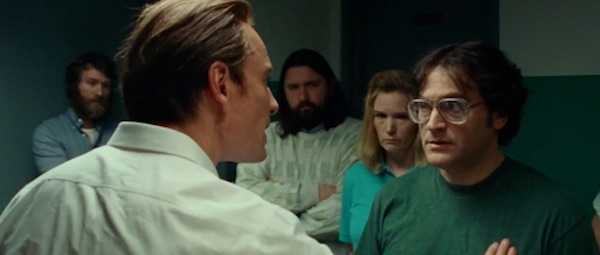
This was a nice way of illustrating his advice and was particularly useful for visual learners. It also taught us how to look out for such techniques in our own film viewings and research.
Lessons 23-24: Writing Captivating Dialogue
“When I’m writing, what the words sound like is as important as what the words mean.”
For many fans of Aaron’s work, dialogue is likely the most anticipated chapter. Aaron is known for his snappy dialogue, and he admits his preference for writing dialogue over action. For him, dialogue is like music and the same rules apply for both.
He gives us some examples of what he considers to be compelling dialogue, including Who’s Afraid of Virginia Woolf? and American Buffalo.
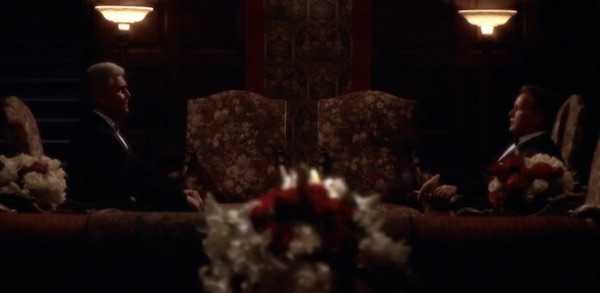
Aaron also shows us clips from The West Wing to illustrate how his dialogue works within a scene. He guides us through a close reading to establish what a scene is doing and how he uses musical terms in his dialogue.
Lesson 25-26: Rewrites
“Rewriting is a lot easier than writing because you have a problem to solve.”
Compared to other writing classes I had taken, Aaron’s MasterClass focused a lot more on rewrites as opposed to simply “editing.” He places a lot of focus on our need to write (sometimes badly) in order to have a script to work with.
He also teaches us how to do the following:
- Determine what does and does not serve the story
- “Kill your darlings”
- Decide which scenes to cut
- Find the right script editors
- Form strong working relationships
- Trust your instincts
- Take notes
What I liked most about this chapter was Aaron’s acknowledgement of how hard it can be to cut out scenes. Throughout the course, he seems sensitive to the issues most writers have and does his best to guide us through these.
His final subchapter on finding a script editor was also insightful for those wanting to write professionally. It gave us some insight into how the relationship between writer and editor can develop. Aaron also advised us on how to stay true to our vision and to critically assess a person’s feedback.
Lessons 27: 34: The West Wing Writers’ Room
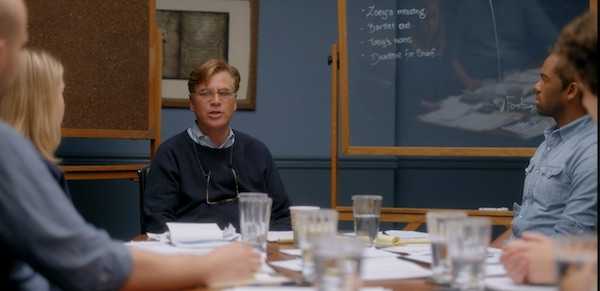
“Specificity, when you’re actually writing, is hugely important.”
Aaron spends the final chapters back in the Writers’ Room with his students. He recreates a genuine Writers’ Room experience by planning a new (and hypothetical) start to The West Wing’s season 5.
Aaron gives us some valuable further viewing in these chapters and also sets out what a good teaser should and shouldn’t have.
In fact, a lot of the group’s discussions turn to how to create compelling characters and develop conflict. It was also nice to witness the process of ideas being sent back and forth.
Lesson 35: Closing Thoughts
“One thing we haven’t talked about is the importance of failure. And it is important.”
In his closing chapter, Aaron discusses the importance of taking chances in this business. As he advised one student in the workshop, confidence is important and a valuable skill for dealing with success and failure.
He leaves us with some open-ended questions we should consider when writing for our audience. In his matter-of-fact manner, he also lays down some unavoidable truths about writing screenplays.
Overall, I found this section motivating. In fact, some users even considered this the most valuable section of the course. After the rather hefty Writer’s Room segments, it was great to have some final words from Aaron on a “1-1 basis.”
What I Liked About Aaron Sorkin’s MasterClass
As a whole, I was really impressed by Aaron’s MasterClass. However, I don’t think it’s perfect by any means. I hope to highlight both the pros and cons below.
It’s a good idea to consider these points before committing to the class.
Learn from a Renowned Screenwriter
While I wasn’t overly familiar with Aaron’s works, I knew his reputation as a screenwriter and was aware of his success in A Few Good Men and Steve Jobs. MasterClass has very few courses on screenwriting specifically, so this was a great opportunity to learn from the best.
In fact, MasterClass has the benefits of unequalled teaching and high production values. Both work to deliver a premium class experience (and even offers a peek into Aaron’s Writer’s Workshop).
Aaron’s teaching style is straightforward and to-the-point. While the MasterClass is lengthy, his chapters are mostly concise. He doesn’t add unnecessary anecdotes to his lessons and we leave each video knowing exactly what we have covered.
Understand the Rules of Drama
Aaron spends considerable time teaching us the rules of drama. Along with recommended reading, he also breaks down Aristotle’s dramatic formula in a way audiences today can clearly digest. He does a good job at distilling difficult theories and presenting it to us in its simplest form.
I liked that Aaron introduced this concept early on, as it underpinned a lot of his later lessons and gave us the right tools to analyze his examples. It also showed us how, if we bear these rules in mind, we can be flexible and endlessly creative with our work.
He refers to A Few Good Men in this chapter, and even takes us through a close reading of how he uses the rules of drama in this film.
As well as this, he also covers how to:
- Translate the rules of drama into the screenplay format
- Understand “acts” and their purposes
- Introduce stakes and solutions in your story
- Use exposition to get audiences invested
It was compelling to hear how passionately Aaron valued these rules, and how we can easily apply them to our writing to create a narrative blueprint. He also balances his teaching with advice on how to maintain creative freedom within what might seem like confining rules.
Strong Case Studies
For me, the highlight of this course was Aaron’s case studies, both from his own filmography and others’. He draws from Shakespearean works to illustrate story arcs and brings in modern equivalents to help us identify patterns.
Along with The West Wing, which he cites most frequently, we also see some examples from other writers. We hear both the read-through and Aaron’s constructive feedback, which is highly valuable.
Practical Advice
A standout feature of this course is how practical and literal Aaron’s advice is. He strays away from literary theory and jargon to talk to us plainly. He backs up any abstractions with concrete explanations and, more often that not, examples.
His examples from The West Wing are where I think this course excels. He uses each lesson to introduce a concept and shows us how he used this in his work. One good instance of this is how he established intention in the cases of Bartlet and Ritchie. Even as someone who hadn’t seen The West Wing, these clips were easy to follow and I knew exactly what to look out for.
Useful Assignments
Like many writing MasterClasses, this course includes a lot of assignments in its Workbook. At the same time, Aaron sets some exercises of his own. This is useful for seeing how an expert practices his craft, rather than what the MasterClass team selects.
It also does a good job of breaking the barrier between Aaron and the viewer, and sets us some work to do actively alongside the videos.
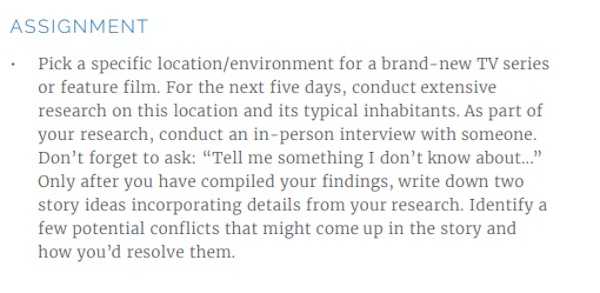
The comment sections and Community Hub were also invaluable when it came to sharing exercises and gaining feedback. It felt a lot more like engaging with a class community rather than passively watching a video series.
Approach to Research
While some writers advise us on the different ways we can research (i.e. reading, daydreaming, etc.), Aaron has some more concrete tips on how to approach research unconventionally. As he tells us, research isn’t a case of gathering and then applying, but can work effectively in any order.
He gives some examples of how he uses music as inspiration and introduces the concept of “researching in reverse” to arrive at an idea. He tells us how he achieved this in The West Wing and dispels the notion that we need an idea to begin writing.
Something I hadn’t expected in this section was Aaron’s discussion of interviewing. He tells us how he approaches sensitive subjects, such as in his interview with Lisa Jobs. He also lays out his procedures for interviews, including how long he thinks a good interview should take.
Writing for Your Audience
Across the course, Aaron places a lot of significance on the audience. As he puts it, the audience is active rather than passive and is a key part of the viewing process. With this in mind, he teaches us how to keep an audience gripped and to grab their attention from the opening scene.
His references to A Few Good Men are helpful in this section, as it compares the play’s audience to that of the film.
He also advises us on how to do the following:
- Let the audience participate
- Understand the audience’s role in the viewing process
- Keep the audience gripped throughout
- Respect and trust your viewers
Aaron makes it clear that once we lose an audience, it’s difficult to get them back. With this in mind, he takes the time to consider a viewer’s relation to what they’re watching and how to best cater to their expectations.
Access
Aaron’s MasterClass is available with subtitles in English, German, and Spanish. This is more accessible than other courses that are only available in English.
The class also has a range of resources to access alongside or separate from the course. These include some of Aaron’s screenplays, and a Workbook with the following features:
- Chapter overviews
- Further research
- Assignments
- Note pages
- Appendix
This was a nice addition to read with the course and provided some helpful further reading. It also has some notepaper for you to print with the rest of the book, and is great for hands-on learners.

What Could Be Improved
While I was impressed by Aaron’s MasterClass, it isn’t without its flaws. Here where I think the course could be improved.
Aaron’s Talking Style
Although I liked Aaron’s no-nonsense approach to teaching, he does begin the course by admitting he’s not the strongest speaker. He has a tendency to stumble through his words and sometimes take his sentences in unexpected directions.
This took some time to get used to;. While he arrives at some strong points, he does take a while to get going. This is worth bearing in mind during the opening sections.
"I’m so enjoying these. It took an episode or two to get used to Mr Sorkin’s way of ‘conveying’ an idea (he weaves and bobs a lot while talking--lol)" - Comment from the community
For some, this wasn’t necessarily a negative. One user actually pointed out the benefits of Aaron following his stream of consciousness to arrive at something better.
"Super excited for this class. I don’t mind when people go on tangents in conversation. It’s an opportunity to better learn something - lets go!" - Comment from the community
I personally didn’t find this to be too much of a problem as the course went on. However, I can understand how it can throw others off when they’re getting started.
Case-Specific
I don’t think it’s essential to know Aaron’s work in great depth, but there are some sections where this would come in handy. One example of this is in the Writers’ Workroom segments, where the students discuss their ideas for The West Wing’s Season 5.
In most of the case studies, Aaron puts his scenes into context for those who might not be familiar. However, some users felt that the course would’ve been more valuable if they’d seen The West Wing for themselves.
"He’s a great teacher. I only wish I had seen the West Wing" "I need to see West Wing. All these classes are going over my head" - Comments from the community
I think this is more the case for the Writers’ Workshop rather than the other case studies. However, some chapters do elaborate on some key plot points that will likely go over your head if you’re not familiar with the series.
Lengthy Workshops
For some, the Writers’ Workroom was the highlight of the course. It offered a unique look into what a writers’ workroom is like and provides examples of script-readings and feedback, which we can apply to our own work.
I often use Reddit to get a feel for students’ feedback before I commit to a course. For one student, the Workshop was a huge plus, even though they felt the rest of the course to be more basic:
"If you know a lot of screenwriting books, there will probably be no new major insights. I still think it was worth it because of the ‘writing room’ where Sorkin sits with some new writers and tries to break the beginning of a new ‘West Wing’ episode. I also found it inspirational to hear Sorkin talk about his writing process" - Comment from Reddit
That being said, I don’t think these lengthy workshops were as helpful as I would’ve liked. All of the writers are already highly skilled and Aaron is very lax with his criticism. As one user pointed out, it would’ve been helpful to have the students’ scripts to refer to.
"It would have been nice to see the screenplays on the screen as they were reading" "Agreed - it’d be really useful to be able to read along, especially for those of us who process and learn better that way" - Comments from the community
Worth the Money?
A common concern when it comes to MasterClass is the cost. This is always a subjective issue, but was one that kept cropping up as users questioned the course’s accessibility for those on a budget.
"This is great. Wish I could afford this MasterClass (among several others). I’m paying my way through film school, though, but that costs like tens of thousands of dollars. Looks like I would learn more from this program than all four years I’ve had in film school though!"
"MasterClass seems awesome. I learn so much just from the trailers. I’d love to sign up but cannot spare $180." [this was the old price]
- Comments from the YouTube trailer
As many have suggested, this course is most suited to those who are just starting out. With that in mind, it’s understandable that a class of this price might be out of their budget. Most users on Reddit did confirm that the course was worthwhile if you had the money to spare:
"I think it was WELL worth it. I’ve read the books, I’ve written a few scripts, I know the rules, but .. it’s about absorbing creative energy and creative desire by osmosis, from the best people you can find. This course lets you spend some fairly intimate time with a master. That to me is worth so, so much more than $90. The production values are amazing. The digital interface is great. The course exercises.. are worth sitting down and ACTUALLY doing. $90? Come on people. For what you’re getting here, that’s a STEAL. It’s also just plain fun" - Comment from Reddit
Who is This Course For?
As many have agreed, Aaron’s MasterClass seems best suited to those who are just starting out in the world of screenwriting. Some users mentioned that Aaron’s teaching was akin to what you would get from Film School or any introductory screenwriting class.
However, Aaron’s MasterClass tackles a tricky and format-specific writing style. So the course may not be suitable for those who are completely new to writing.
If you take this MasterClass, you can expect to learn the following:
- The rules of storytelling
- How to create drama
- What to consider when approaching different formats
- How to find conflict between characters
- Ways to introduce character motivation and obstacles
- What to keep and avoid when revising your drafts
- How to write characters rather than people
On a scale of 1-10 (1 being a beginner and 10 being an expert), I’d say this course is geared towards those in the range of 3-8). While many users point to its foundational level of teaching, Aaron does assume a lot of prior knowledge on behalf of the viewer.
How much does the course cost?
At the time of writing MasterClass had three subscription offers. The cost of these (per month) is:
- Individual (1 user) $10
- Duo (2 users) $15
- Family (up to 6 users) $20
All are billed annually, which at first glance may seem pricey.
However, you can considerably reduce your costs by joining with friends or family. And of course by taking as many courses as possible.
With nearly 200 courses on the platform you’re likely to find quite a few to interest you. Even if you buy an individual membership and find only 10% of the courses of interest this still works out to only $6 a course:
$120 (annual individual membership fee) / 20 courses = $6.
And if you join with friends or family then the cost of each course is drastically reduced. Check out our MasterClass review or MasterClass cost articles to see how.
Bearing in mind that these classes are taught by global leaders in their fields the value is unbeatable. You can pay over $100 for an online course taught by someone you’ve never even heard of, never mind an academy award winning screenwriter!
What’s more, MasterClass also offers a 30 day refund if you’re unhappy with your purchase.
You can also buy MasterClass as a gift.
Alternatives to Aaron Sorkin’s MasterClass
If you’re not sure whether Aaron’s MasterClass is right for you, there are some other relevant MasterClasses available including the following:
- The Duffer Brothers – Developing an original TV Series
- David Lynch – Creativity and Film
- Werner Herzog – Filmmaking
- Mira Nair – Independent Filmmaking
- Ken Burns – Documentary Filmmaking
- Spike Lee – Independent Filmmaking
- Ron Howard – Directing
- Martin Scorsese – Filmmaking
- Shonda Rhimes – Writing for Television
Meaning that for the price of a single MasterClass subscription, you already have access to 8 other relevant MasterClasses. For an overview of other popular classes on the platform check out our best MasterClass article.
Outside of MasterClass, there are other options. These include various courses on Udemy and Skillshare which we have reviewed in our best online screenwriting classes review.
While these courses might be helpful, I don’t think they compete with MasterClass’s premium level of teaching and production.
Aaron Sorkin’s MasterClass: What Others Have Said
When I was reading others’ opinions of this course, I noticed a lot of mixed reviews. For many, the course met and even exceeded their expectations. A recurring positive was Aaron’s upfront approach to teaching and his use of relevant case studies.
"Absolutely brilliant! That’s how I imagine a MasterClass. Bravo Aaron Sorkin!" "I love the practical example Aaron uses of how he developed The Social Network. It makes the content relatable." - Comments from the community
Aaron’s teaching is engaging and personable throughout the course, and is the closest we get to a 1-1 experience. He goes into a lot of depth about the rules of drama without overwhelming the viewer.
At the same time, his speech is sometimes difficult to follow. Some even recommended increasing the video speed to stay engaged.
"I love his work but it is hard to focus when he says um every 10 seconds." "I found it easier to change the speed of the video to remain engaged." - Comments from the community
A common complaint was about the Writers’ Workroom. Some of the Workroom lessons were simply repetitive and could have been condensed to keep us engaged. As many noted, the writers were of similar levels and this didn’t allow for much criticism to be brought forward.
That being said, most users attested that the course was worthwhile, even if it seemed a little basic to some. Most users on Reddit agreed that the class wasn’t completely original, but found it valuable learning nonetheless.
How long it took to complete the course
Aaron’s MasterClass is fairly lengthy, covering nearly 8 hours of content across 35 lessons. While most of his videos are between 5 and 10 minutes long, some sections are much longer and can be difficult to follow in one sitting.
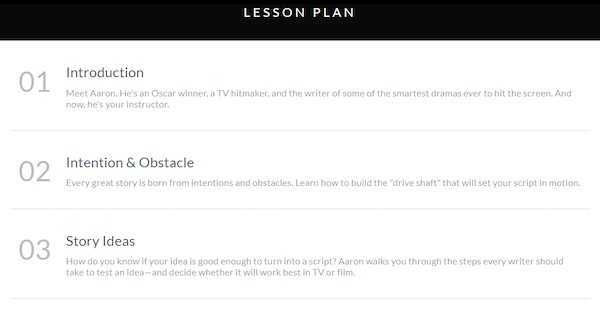
I would recommend spreading the course out over at least a week. You could benefit from chunking some of his sections together as a lot of them flow on well from the last.
The Workbook is a lot quicker to get through, and it’s helpful to print the PDF out so you can make notes in the relevant sections. There is also a Community Hub where you can discuss each lesson afterwards.
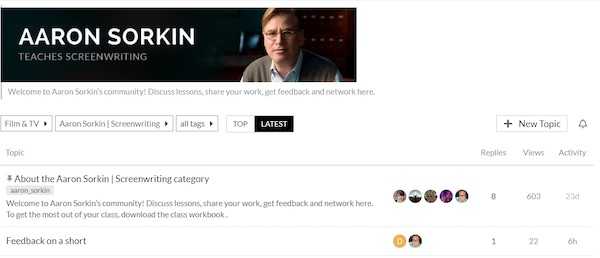
The additional resources are helpful for those with different learning styles. I particularly liked that MasterClass added in note-taking pages under each chapter to help us keep the PDF and our notes as a complete unit.
Is the content unique?
As many users have pointed out, Aaron’s MasterClass isn’t particularly unique. He references a well-known text, which underlies most of his teaching. He also engages in a lot of interviews and discussions about his writing process elsewhere, including an hour-long talk about character.
What stood out to me was a Reddit post where Aaron addresses himself to his fans. He gives them the chance to ask him any questions they have. Aaron certainly doesn’t seem guarded about his writing process and is happy to share his advice with the world.
Getting a 1-1 engagement with Aaron definitely isn't a unique feature.
With that in mind, I struggled to find any other resources that covered as much depth as Aaron’s MasterClass. One benefit of the course is having 7+ hours of teaching all in one place. In fact, MasterClass does a good job of organizing these into sizable chapters and is easy for users to dip in and out of.
What You Will Need
Aaron’s MasterClass doesn’t require any additional tools to complete. It can be handy to have a printer if you’d like to annotate the Workbook.
Aaron Sorkin MasterClass: Is it worth it?
Having read mixed reviews about this MasterClass, I was surprised by how much I enjoyed it. I wasn’t familiar with most of Aaron’s work, but he set out his teaching in such a way that it was easy to follow regardless.
It’s true that Aaron’s “rules of drama” are not original. That being said, I think Aaron does a great job of making these rules accessible for a modern audience and he helps to steer us in the right direction for our writing.
He also gives equal attention to film and TV writing, which is useful to know if you want to focus on a specialty.
If you don’t think Aaron’s teaching style is for you, David Mamet has a MasterClass on Dramatic Writing that users have also praised highly.
That being said, if you have any interest or experience in basic screenwriting, Aaron’s MasterClass will likely be insightful. It’s especially useful to see how his ideas translate onto the screen and I found that I came away with plenty of helpful notes.
For anyone with a screenplay in the back of their mind, Aaron’s MasterClass is a great opportunity to help you start writing. I found him motivating throughout and liked that he included case studies and workshops.
If you’re interested in other aspects of film, the all-access pass allows you to mix and match several screenwriting and filmmaking classes to attain a lot of useful information. And with a 30 day money back guarantee you have nothing to lose by giving MasterClass a go.
Frequently Asked Questions
A MasterClass individual subscription is $120 per year giving you access to all 190+ classes on the platform.
It is 7 hours and 58 minutes long, divided into 35 lessons.
There is no way you can access Aaron’s MasterClass for free. MasterClass has a trailer for this course, so you can get a feel for whether this is the class for you.
MasterClass has a 30 day refund policy if you purchase the class direct through them. If you purchase through another supplier, their returns policy may apply.

Rebecca graduated from King's College university with a first class honours in English Language, followed by a Masters' Degree in Eighteenth Century Studies.
